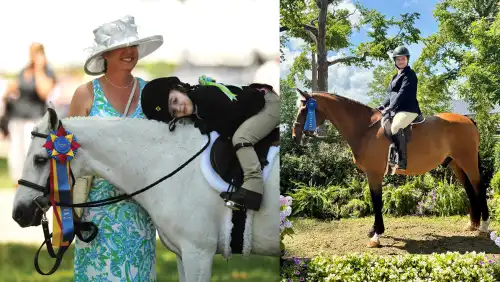Every barn family has that one member. The one who shows up to every show, boot rag in hand, ready to cheer on her fellow riders. The one who’s always happy to get on whatever horse needs work, whether she knows him or not. She’s the one who gets on an impossible number of horses in a day and seems to live at the barn every weekend. At Breakaway Farm near Madison, Wisconsin, Katie Nichols is that person—the glue that keeps her barn family together.
Nichols, 24, lives and breathes the world of horse shows, even though she has a full-time job teaching fourth grade at Kate Goodrich Elementary School in Merrill, Wisconsin, some 2 1/2 hours away from the barn.
“When I’m not at the horse shows I call my trainer each day and make them give me the whole rundown on how everyone did and how each horse was,” she said. “I love horse shows; they’re this world you get fully immersed in, and the rest of the world kind of stops when you’re there.”

Katie Nichols shows her off-the-track Thoroughbred Southwest Charmer in the hunters. Andrew Ryback Photography Photo
Nichols learned to ride after her cousins convinced her parents to send her to horse camp one summer in elementary school. From there, she moved to a show barn and converted from hunters to jumpers, catch-riding whatever she could at B, AA, and A shows on the Wisconsin/Illinois circuit throughout high school and college.
After graduation, Nichols balanced a part-time job as a special education paraprofessional, tutoring and long weekends spent at Breakaway or on the road, grooming for trainers Ginny Dvorak and her daughter Abbie Dvorak. This year, Goodrich took the full-time teaching job far away from her friends and family in northern Wisconsin.
“It’s weird, every day after school I have free time,” she said. “I don’t go to the barn and ride.”
ADVERTISEMENT
Her challenging schedule is especially problematic since Nichols bought her first horse five years ago. Nichols and her trainer were looking for a young prospect on a small budget and found a recently off-the-track Thoroughbred named Southwest Charmer (“Grady”) at a small barn in Illinois. The man who sold the Thoroughbred to Nichols almost didn’t show him to her—and when he brought the horse out to the round pen, his trot took Nichols’ breath away.
“My jaw dropped,” she remembered. “My trainer said, ‘Don’t look too excited.’ I tried him in a round pen. Pretty much, I saw him trot, and he had a really nice trot. I got on, and I couldn’t really get him to canter, so I said, ‘OK, I think this is the one!’ He was really, really quiet.”

Southwest Charmer on his first day with Katie Nichols. He retired from racing after three starts. Photo Courtesy Of Katie Nichols
Nichols had originally been looking for a jumper, but she quickly realized Grady’s movement combined with his slower pace made him perfect for the hunter ring, so she switched disciplines.
“I was very excited because for the money I had spent I had a very fancy horse,” she said. “As time has gone on I have learned so much. Now I love the hunters. I’ll probably always want to keep doing it. With the jumpers, you land, turn, next jump. With the hunters, you find the corner, do the lead change, take a few deep breaths, instead of go, go, go.”
Nichols said riding in the hunters has also taught her to think differently about problem solving in her riding. Where she would have once corrected a crooked line with an open rein, she now thinks about finessing, staying soft and correcting with leg.
Nichols and Grady (Flight West—Charming Janie, Tiger Talk), now 8, have been successful in their transition. Grady was the top money-winning Thoroughbred for 2017 and 2018 in the USHJA Green Incentive Program. Nichols expects to qualify for the North American League West Coast Hunter Finals and the AON/USHJA National Championships in Las Vegas, though she’s not yet sure whether she’ll make the trip for either.
ADVERTISEMENT

Southwest Charmer is enjoying his new job as a hunter, pictured here with trainer Abbie Dvorak-Peat. Andrew Ryback Photography Photo
“He’s been a very humbling horse and a horse that has really shown me how trusting the process and taking it slow, how important that is, and how much you can get out of it,” she said.
“Sometimes at horse shows he’s not always the horse you have at home, so I’ve had to learn how to ride on the fly, but I’ve also had to learn how to keep my emotions in check. It takes time; it takes time for me to become a better hunter rider, and it takes time to develop a green horse.”
Grady has also taught Nichols something else about herself—she really loves working with green horses, and Grady isn’t green anymore. Nichols said she’s made the difficult decision to sell him, but she’s in no hurry as she looks for the perfect home. After all, he has given her a lot of lessons in his journey.
“He has also taught me not to get too into what other people are doing with their horses,” she said. “Their stories are different. It’s about celebrating my successes, and they don’t come from ribbons. I’m one who will be happy if I have a good round no matter how I place, and if I have a bad round and I win I’m still going to be a little upset. He’s really taught me the importance of focusing on yourself and not everyone else at the horse show.”
Do you know an amateur rider who has a cool story? Email Lindsay at lberreth@coth.com for a chance to have them featured!














